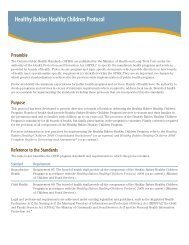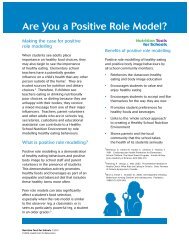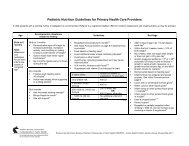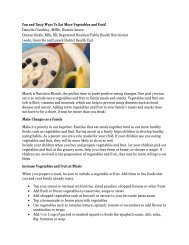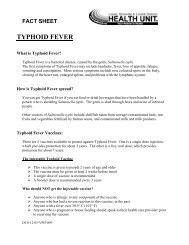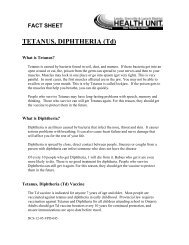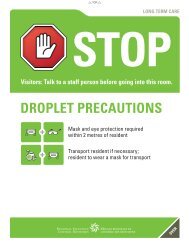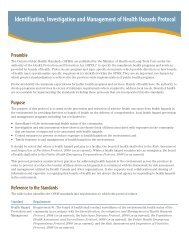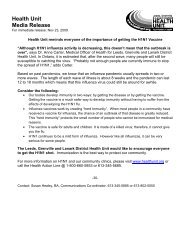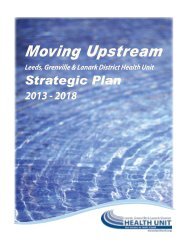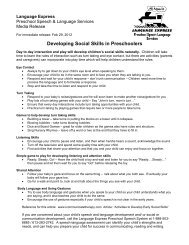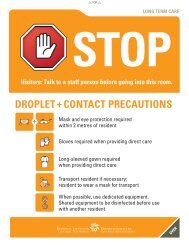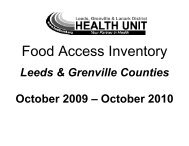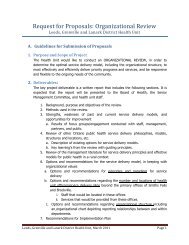Red Flags â - Leeds, Grenville and Lanark District Health Unit
Red Flags â - Leeds, Grenville and Lanark District Health Unit
Red Flags â - Leeds, Grenville and Lanark District Health Unit
You also want an ePaper? Increase the reach of your titles
YUMPU automatically turns print PDFs into web optimized ePapers that Google loves.
OTHER FACTORS<br />
POSTPARTUM DEPRESSION<br />
Postpartum “blues” are considered normal. They affect up to 80% of new mothers. They can occur 3<br />
to 4 days after birth <strong>and</strong> can last up to 2 weeks. With good physical care <strong>and</strong> emotional support, these<br />
symptoms will go away (e.g., crying spells, feeling sad, irritability, frustration).<br />
Untreated postpartum depression impacts a child’s development, as parents may have altered<br />
ability to be attentive, attuned <strong>and</strong> able to respond appropriately to the infant or child{ren}. For<br />
more information on how red flag behaviours may be present in families experiencing postpartum<br />
depression, please see sections on: Attachment, Social/Emotional, Abuse, Behaviour, Family<br />
Environmental Stressors.<br />
Postpartum Depression may start prenatally, <strong>and</strong> is part of the spectrum of postpartum mood<br />
disorders. A woman who has a personal or family history of depression/anxiety <strong>and</strong>/or history of abuse<br />
or neglect may be at increased risk of postpartum depression.<br />
<strong>Red</strong> <strong>Flags</strong> for Postpartum Depression:<br />
If mom is experiencing any of the following beyond 2 weeks of the birth of the child:<br />
►► Sad <strong>and</strong> tearful<br />
►► Exhaustion<br />
►► Changes in eating <strong>and</strong> sleeping patterns<br />
►► Feeling overwhelmed with inability to<br />
concentrate<br />
►► <strong>Red</strong>uced interest or pleasure in family<br />
<strong>and</strong>/or activities<br />
►► Hopelessness <strong>and</strong> frustration<br />
►► Restlessness, irritability or anger<br />
►► Extreme highs, full of energy<br />
►► Guilt <strong>and</strong> shame, thinking she is not a<br />
good mother<br />
►► Poor attachment (e.g., unable to read<br />
baby’s cues)<br />
►► Afraid to be alone with baby<br />
►► Repeated scary thoughts about the baby<br />
►► Thoughts of harming self or baby<br />
►► Altered mood; anxiety <strong>and</strong>/or depression<br />
►► Lack of supports/partner<br />
►► Recent stressful life event<br />
►► Isolation, lack of transportation<br />
►► Financial concerns which may lead to<br />
inadequate access to food <strong>and</strong>/or housing<br />
►► Unrealistic expectations of self or child<br />
►► Substance abuse<br />
WHERE TO GO FOR HELP<br />
See Postpartum Depression in the Where to Go<br />
for Help section at the back of this document.<br />
38 <strong>Red</strong> <strong>Flags</strong>: Early Identification in <strong>Leeds</strong>, <strong>Grenville</strong> & <strong>Lanark</strong> November 2007



